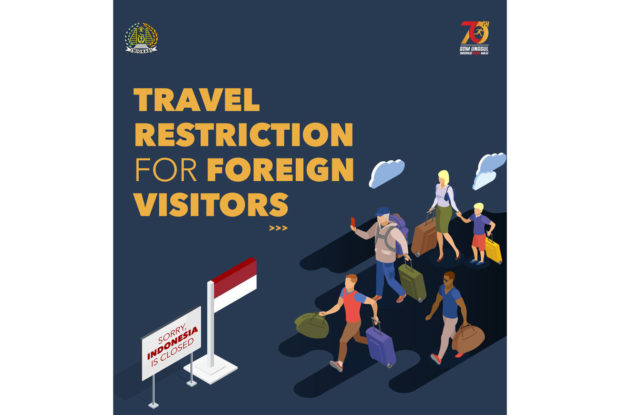
No entry: Law and Human Rights Ministerial Regulation No. 11/2020 imposes a temporary ban on foreigners entering Indonesia from April 3, with an exception to those who meet certain binding requirements. Courtesy of Law and Human Rights Ministry via The Jakarta Post/Asia News Network
JAKARTA — Indonesia has temporarily banned foreigners from entering Indonesia as mitigation efforts are continuing to curb the spread of COVID-19 in the country. The ban, which is stipulated in the newly issued Law and Human Rights Ministry RegulationNo. 11/2020 on the temporary prohibition of foreigners entering Indonesia, became effective on April 3.
This regulation also applies to transiting in the country.
With the COVID-19 outbreak having become a pandemic in more than 160 countries, the ban, as Minister Yasonna H Laoly says, applies to all foreigners with the following six exceptions:
- Foreign holders of limited stay permits and permanent stay permits;
- Foreign diplomatic visa and service visa holders;
- Foreigners who hold diplomatic stay permits and official stay permits;
- Medical and food aid and support workers for humanitarian purposes;
- Crews of sea, air and land transportation conveyances;
- Foreigners working on national strategic projects.
The excluded foreigners must meet the following requirements:
- They present a medical certificate in English issued by the health authorities of their respective country;
- They have been 14 (fourteen) days in the territory/country and free from COVID-19;
- Statement of being prepared for quarantine for 14 days carried out by the government of Indonesia.
This ministry’s regulation also regulates foreign nationals in Indonesia under the following circumstances:
- Foreign nationals, who have visit permits (including free visa or visa on arrival) that have expired and/or cannot extend their residence permit, will be granted a related residence permit automatically, free of charge, without the need to ask permission from the Immigration Office.
- Foreign nationals holding limited stay permits and permanent permits that have expired and/or cannot be extended again, will be given a suspension and granted an approved residence permit, free of charge, without the need to ask permission from the Immigration Office.
The enactment of this ministry’s regulation automatically annuls Regulations No. 7 and 8/2020.
Indonesia is among the ASEAN countries that have imposed tighter measures at their entry points. As reported on aseanbriefing.com, Brunei has banned visitors from the Chinese provinces of Zhejiang and Jiangsu from entering the country with the exception of Brunei citizens and permanent citizens.
Cambodia has announced a ban on the entry of foreigners from Italy, Germany, Spain, France and the United States for 30 days.
Laos has closed all international checkpoints to stop foreign passengers from exiting and entering the country.
Malaysia has shut its border with Singapore, which itself has expanded its stay-home notice to include countries such as France, India, Switzerland and all ASEAN countries.
Myanmar suspended issuing entry visas on March 29 while Thailand was reported to have closed its land borders beginning late on Monday, by closing down all border checkpoints including the crossings between Thailand and Malaysia, Thailand and Laos in Nakhon Phanom and the crossings between Thailand and Cambodia in Sa Kaeo province.
Thailand will also stop issuing visas on arrival for visitors from all countries that were previously eligible for them and cancel visa exemptions for visitors from South Korea, Italy and Hong Kong.
Vietnam’s Immigration Department, meanwhile, will allow foreign nationals on visa-free, tourist visas (including e-visas) that are unable to leave the country, to extend their stays up to a period of 30 days by filing an application with the authority. The policy is effective from March 30 to April 30.
As of 11 a.m. Jakarta time on April5, the number of global coronavirus cases reached 1.27 million with a total of 69,456 deaths, according to worldometers.info website.
The US reported the highest number of cases at 336,830 but Italy topped the list of worst-affected countries with 15,887 deaths followed by Spain with 12,641 and the US with 9,618 fatalities.
Indonesia, as of April 5, had 2,273 cases, a sharp rise since the first case was reported only on March 2 and 198 deaths.
Besides the ban on entry, other measures have also been taken by the government to try to cut the transmission chains of the virus.
The government has warned against the traditional exodus during the next Idul Fitri festival.
Lowering the corporate income tax rate from 25 percent to 22 percent has also been pursued this year to ease the burden on businesses from the impact of the outbreak.
The Jakarta governor has now extended the capital’s state of emergency status until April 19.
The Financial Services Authority (OJK) will extend loan payment deadlines for micro, small and medium enterprises for up to one year to counter the economic impacts of the pandemic.
Rapid testing has been launched in areas where there have been a large number of cases of the virus.
And in anticipation of a further escalation in the number of cases the government has turned the former athletes village for the 2018 Asian Games into a coronavirus hospital, which can treat as many as 22,000 patients.
About 50,000 prisoners are scheduled to be released early as the country seeks to avoid possible infections in its prisons.
Minister Yasonna says that those prisoners must fulfill certain conditions for their early release. The prisoners include those convicted on drug charges who had served five to 10 years in prison, inmates convicted of graft charges aged 60 years and above and special crime convicts with chronic diseases.
The list also includes foreign inmates who have served two thirds of their sentences.